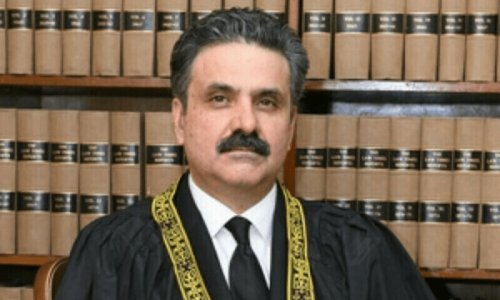
MILITANTS in Pakistan have struck across the length and breadth of society, from ‘hard t argets’, including personnel of the armed forces and law enforcement agencies, to ‘soft’ ones, such as markets, schools and places of worship. On each occasion, various terrorist groups have applied their own twisted logic to justify their crimes.
On Friday, the militant Islamic State group struck the convoy of Senate Deputy Chairman and Jamiat Ulema-i-Islam (Fazl) leader Maulana Abdul Ghafoor Haideri, in Mastung, Balochistan. This is not the first time militants have attacked religious figures; in the past the Tableeghi Jamaat has been targeted, as have been ulema who have opposed the terrorists and their tactics. Indeed JUI-F chief Maulana Fazlur Rehman himself has survived attempts on his life in the past.
However, the question on many minds is why IS would target the JUI-F. After all, the security forces, religious and sectarian minorities and symbols of the state appear to be ‘natural’ targets. But why a religious party? Dawn spoke to Amir Rana, an expert on militancy and head of the Pak Institute for Peace Studies, to understand the method beyond IS’s madness.
Q1: The most obvious question is why would IS target the JUI-F?
A: It has not been established yet [that] the Islamic State or some other local groups managed the attack. However, the Islamic State is an anti-democratic group and opposes the parties and individuals who support democratic values. The JUI-F is primarily a political party and believes in political pragmatism. The party has recently organised an international conference near Peshawar and comes up with a clear stance against militancy and extremism.
Q2: The state in Pakistan has sent mixed signals regarding the presence of IS in this country, ranging from flat out denial to claiming there are ‘sympathisers’ of the outfit present. Does the latest attack, as well as the devastating recent bombing in Sehwan, not point to a considerable presence of IS in Pakistan?
A: The Islamic State is a big inspiration for local sectarian groups and it has widened their ideological and strategic spectrums. The Lashkar-i-Jhangvi al-Alami and Jundullah are groups which have developed ideological and operational compatibility with the global terrorist group. These local groups want to make a big impact and this is good for the IS as well because they have a partner without spending many resources.
Q3: What role do you think can mainstream religious parties like the JUI-F, Jamaat-i-Islami, etc play in countering the messaging of terrorist groups like IS, TTP, etc from the religious point of view?
A: The clear stance of mainstream religious parties against extremism discourages the fence-sitters from joining militancy. Those who have chosen the path of destruction and become part of different violent ideological paradigms will hardly pay attention to such messages.
Published in Dawn, May 14th, 2017











































Dear visitor, the comments section is undergoing an overhaul and will return soon.